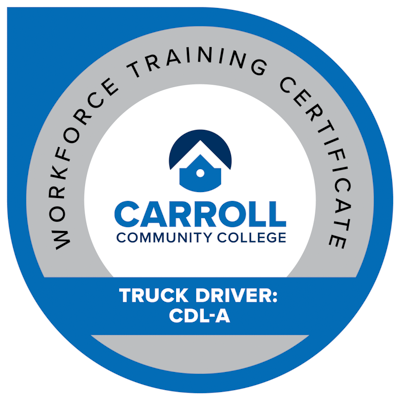Truck Driver – CDL A Certificate

At a Glance
Start a Rewarding Career Behind the Wheel as a Commercial Truck Driver
Our Truck Driver CDL-A Certificate Training Program qualifies you to operate different types of commercial trucks and tractor trailers. The state-approved coursework combines classroom learning and hands-on driving experience to prepare you for the Maryland CDL exam and a future as a professional truck driver.
Duration:
280 hours/8 weeks
Program Cost:*
$5,500 (up to 100% may be covered by the Ratcliffe Works Grant; Apply for Assistance)
Schedule:
Offered 5 times a year; Winter, Spring, Summer & Fall (2X)
Certification Earned:
Maryland Class A CDL License
Helpful Resources
What You’ll Learn

This comprehensive 3-part training series prepares students to earn their Maryland Class A Commercial Driver’s License (CDL) and launch a career as a professional truck driver.
You will learn:
- CDL theory and preparation for the Maryland Class A Learner’s Permit
- Hazardous materials, alcohol awareness, and FMCSA regulations
- Pre-trip inspections and air-brake leak tests
- Hours of service, logbook use, and trip planning
- Map reading and understanding road signs
- Defensive driving and accident prevention techniques
- Backing, parking, and shifting maneuvers
- Safe operation of Class A tractor-trailers
- Use of mirrors, lane changes, and merging
- Handling road hazards, emergencies, and breakdowns
- Skills to pass the MVA Class A CDL exam and begin working as a commercial driver
Curriculum
The CDL-A Certificate Training Program is structured as a 3-part series designed to guide students from the basics of commercial driving to full licensure and job readiness. Each course builds on the last, combining classroom instruction with practical, behind-the-wheel experience.
Licensure/Certification Earned
Upon successful completion of the CDL-A Certificate Training Program and the MVA written and driving tests administered during class, an MD CDL-A license will be awarded.
Why Choose Carroll’s CDL-A Training?
- Fulfills State Requirements: Our CDL-A Certificate Training Program meets all Maryland Vehicle Administration (MVA) and Federal Motor Carrier Safety Administration (FMCSA) requirements for commercial driver education.
- Learn from the Best: Experienced instructors not only teach the course content, but act as mentors with their real-life experience being on the road. As such, they can demonstrate how to handle “soft skill” challenges such as dealing with customer complaints or problems with management.
- On-Campus Range: Our onsite range has been certified by the MVA as a remote testing facility. All of your training and your licensing test will be held on our Westminster campus.
- Affordable: Up to 100% of the program cost may be covered by the Ratcliffe Works grant for eligible participants.
Get Paid to Prepare for This In-Demand Career
Career Outlook
The demand for commercial truck drivers remains robust, with the U.S. Bureau of Labor Statistics projecting a 5% growth in employment for heavy and tractor-trailer truck drivers from 2023 to 2033. This growth is expected to result in approximately 240,300 job openings annually, largely due to the need to replace retiring drivers and those transitioning to other careers.
The industry continues to face a significant driver shortage, with estimates suggesting that 1.2 million new drivers will be needed over the next decade to meet freight demands. This shortage has led to competitive compensation packages, with new drivers starting around $50,000 annually and experienced drivers earning well over $90,000, especially in specialized freight sectors.
As the trucking industry evolves, companies are increasingly offering incentives such as sign-on bonuses, comprehensive benefits, and modern equipment to attract and retain drivers. These trends indicate a promising and stable career path for those entering the field.
Get Started Today
410-386-8100 | wbce@carrollcc.edu | Building A, Room 115
*Unless noted, cost does not include any required textbooks and related materials, applicable licensing fees, background check fees, testing fees or prerequisite courses.